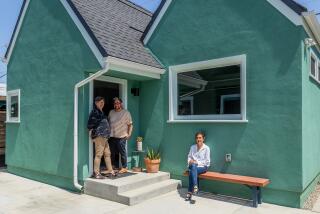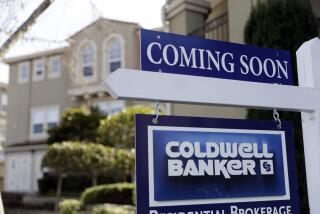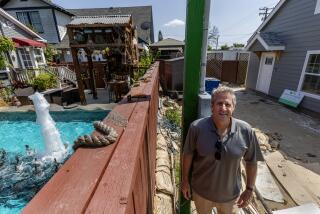Q&A: HOA parking restrictions should be rooted in reality, not for sake of appearances
- Share via
QUESTION: My parents purchased a five-bedroom home with a small two-car garage in an “exclusive” homeowner association, and I am beginning to think they made a huge mistake.
Over the years, they have become disabled and require full-time assistance. But that’s a problem for the caregivers since my parents park their own vehicle on one side of the garage and use the rest for storage — and the association makes it difficult to find parking.
The association prohibits parking in owner driveways and overnight on the street, and allows street parking only during the day with a temporary permit that lasts three days. What’s more, it’s a Scrooge about issuing them, since the board is obsessed with keeping the development looking upscale. Each household can get only one per month, and renters aren’t allowed any.
As a result, costly revenue-generating tickets are issued in abundance, which I suspect is another underlying motive. And for over eight years, hundreds of guests, renters, caregivers and owners with more than one car have parked at a small lot outside the development owned by the association.
But then the board closed that lot, and everyone was instructed to park at a local school or a grocery store nearly a mile away. Now, the school and stores have installed fences with tow warnings. We try to park in neighboring streets outside the development, but they are congested and you typically can’t find an open spot.
Parking a mile away and biking or walking in the dark through dangerous traffic, cold weather and rain is untenable, but board members refuse to make any exceptions or change the rules. I guess the board expects everyone to pay to take Uber.
The city told us that the developer was not required to supply parking inside or outside the development and that the board’s actions are not illegal. Can we do anything about this?
ANSWER: Your association’s board was elected by a majority of titleholders and because of that, courts recognize the concept of “majority rule” by giving deference to board decisions in management. There is a presumption that the board is in the best position to gauge the pulse of its community when imposing rules and regulations.
But the board needs to do a better job recognizing the changing needs of its community, especially as its members age.
All association rules — especially rules that affect quality-of-life issues such as burdensome parking restrictions — should be rationally related to a legitimate purpose of the association. Not allowing caregivers to obtain street parking passes of reasonable length is not reasonable. The abundance of tickets issued to enforce these draconian parking rules proves it is overly restrictive.
You should request board minutes from the meeting during which the decision to close the small parking lot outside the association was made. Find out whether there was a good reason for the closure and whether the board properly considered the impact the closure would have on the titleholders.
When owners have governance issues, they should, to the extent possible, look first to exhausting their internal administrative remedies. If they are able, your parents as titleholders should attend board meetings and voice their concern during the open speaker’s forum. They should explain the severe consequences your family is experiencing due to the board’s parking restrictions. If they can’t attend because of their disabilities, obtain a power of attorney to speak on their behalf.
If your family has already tried these steps and was unsuccessful, don’t be discouraged. Learn whether other owners are equally frustrated, then take steps to overturn the parking rules. If the majority of owners agree that the association’s current rules and regulations aren’t working, then they need to support a change.
What’s more, the decision to close the only available parking lot, subjecting people to a long walk just to get to the development, raises serious safety concerns. It also raises the question of whether the board is interfering with the ability of owners to reach or leave their properties.
Given the totality of the circumstances, the board should be concerned that its hard-line approach in handling parking issues disenfranchises titleholders and creates a big liability for the association if a titleholder were to be injured while trying to get to the development.
Board directors should be forewarned that if they acted unreasonably they may personally share in that liability for creating this situation in the first place.
With or without the cooperation of the board, titleholders should take steps to amend and revise the association’s rules and governing documents to ameliorate these problems.
Zachary Levine, a partner at Wolk & Levine, a business and intellectual property law firm, co-wrote this column. Vanitzian is an arbitrator and mediator. Send questions to Donie Vanitzian, JD, P.O. Box 10490, Marina del Rey, CA 90295 ornoexit@mindspring.com
More to Read
Inside the business of entertainment
The Wide Shot brings you news, analysis and insights on everything from streaming wars to production — and what it all means for the future.
You may occasionally receive promotional content from the Los Angeles Times.










